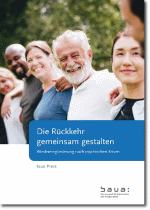Managing RTW Together: Returning to Work after Mental Crises
(in German)
The proportion of workers on sick leave due to mental illnesses such as depression, adjustment disorders, and anxiety has risen constantly in recent years in Germany. Mental disorders are now the second-most-common diagnosis group for which sick notes are issued. As a result, returning to work (RTW) and workplace health management are becoming ever more significant: its rationale is to sustainably preserve employees’ work ability following a mental crisis or mental illness.
People suffering from mental illnesses are often the ones who take responsibility for their work, commit to it, enjoy their jobs, and act as the “social glue” in their teams. It is consequently essential for workplaces, companies, and organisations to proactively manage the RTW process. This means all those involved collaborate as equals: returning employees, their line managers, the bodies representing workers’ interests, company doctors, , colleagues, therapists, the doctors responsible for employees’ treatment, and any other stakeholders. The foundations are mutual trust, understanding, and empathy.
This brochure offers an overview of the topic and provides concrete, practical guidance for all those involved in the RTW process. What steps help someone return to work successfully? Which aspects should be dealt with by which stakeholders? What needs to be paid particular attention to? The discussion of these questions focuses on the returning employee and their voluntary participation in the operational integration management process (German: betriebliches Eingliederungsmanagement). The brochure is mainly based on the four-phase RTW model that has been developed by the Federal Institute for Occupational Safety and Health (German: Bundesanstalt für Arbeitsschutz und Arbeitsmedizin, BAuA):
- Phase 1: Co-orientation
- Phase 2: Coordination
- Phase 3: Cooperation
- Phase 4: Renewed co-orientation
This model facilitates a systemic RTW process. Its application will foster trust in the key RTW stakeholders and the process as a whole.
The brochure also includes two exemplary case reports that give insights into the experience, behaviour and actions during the RTW process from the perspective of returning employees.
Several fact sheets with in-depth information about RTW issues are also available to download (see below).
Please download the complete brochure "Managing RTW Together: Returning to Work after Mental Crises" (in German only).
Bibliographic information
Title: Die Rückkehr gemeinsam gestalten - Wiedereingliederung nach psychischen Krisen.
Dortmund:
Bundesanstalt für Arbeitsschutz und Arbeitsmedizin, 2021.
ISBN: 978-3-88261-738-2, pages: 56, Project number: F 2319, paper, PDF file, DOI: 10.21934/baua:praxis20210215



